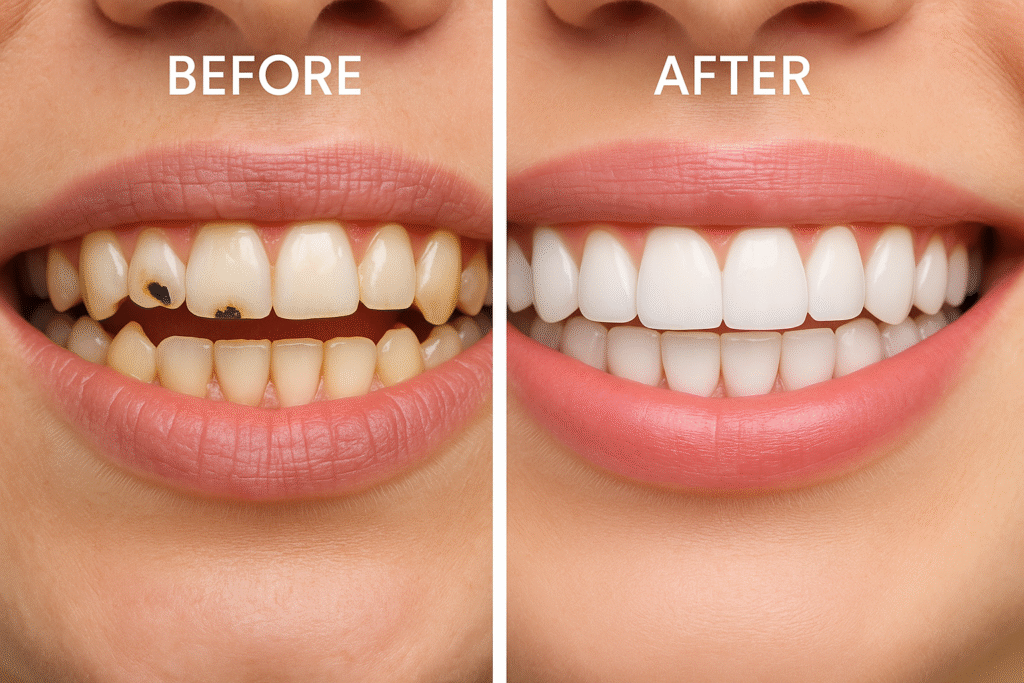Full Mouth Rehabilitation in Kitchener – A Fresh Start for Your Smile

Have you been avoiding the dentist for years? Do you feel like your teeth are “too far gone” to be fixed? At MI Dental in Kitchener, we want you to know two things: You are not alone, and it is never too late.
Our Full Mouth Rehabilitation program is designed for patients with complex dental needs who want a complete reset. Whether you are dealing with missing teeth, severe wear, or widespread decay, Dr. Manzoor and his team on Battler Road provide a judgement-free, step-by-step plan to restore your smile, your health, and your confidence.
Sometimes life gets in the way of dental care. Whether due to fear, anxiety, depression, disability or other challenges, many individuals avoid dental visits for years. Over time, this can lead to a wide range of oral health problems: bleeding gums, broken teeth, cavities, missing teeth and worn-out restorations.
When patients finally feel ready to take control of their oral health, they often need a comprehensive, multi-phase approach. At MI Dental, our Full Mouth Rehabilitation program is designed to restore function, comfort and confidence, step by step, with compassion and professionalism.
Is This Treatment Right For You?
- Gums: Swollen, bleeding gums with gingivitis or periodontitis. Patients may avoid brushing areas that bleed, worsening the condition.
- Teeth: Broken teeth, small and large cavities, sometimes with open holes that trap food.
- Missing Teeth: Spaces left untreated for years.
- Old Restorations: Worn, chipped or leaking fillings in need of replacement.
It is rarely just one issue, it is a mixed bag. That is why a comprehensive plan is so important.
Step 1: The Comprehensive Assessment
Before treatment begins, we complete a thorough evaluation of both soft and hard tissues:
- Full charting of existing dental work and each tooth surface.
- Gum pocket measurements (six points per tooth).
- X-rays to detect hidden problems.
- Intraoral photographs to help patients visualize their current oral health.
At every step, patients are kept actively involved, we explain findings clearly, so they understand both their challenges and the solutions ahead.
Step 2: Oral Hygiene Establishment
Objective: Create a clean, stable foundation for treatment.
- Thorough scaling and polishing to remove plaque, tartar, and irritants.
- Gum massage and patient education on proper brushing (bleeding gums must be cleaned, not avoided).
- Beginning of gum healing, reduced swelling, fresher breath and a healthier environment for further care.
Step 3: Disease Control Phase
Objective: Eliminate infection and disease, stabilize the mouth.
- Restorations: Treat all active cavities with fillings.
- Extractions: Remove teeth that cannot be saved.
- Gum Therapy: Scaling and root planing or adjunctive laser therapy if required for periodontal pockets.
By the end of this phase, the mouth is disease-free — ready for restorative work.
Step 4: Rehabilitation Phase
Objective: Restore function, aesthetics, and long-term stability.
- Restorative Care: Replace worn fillings, crowns, or bridges.
- Tooth Replacement: Implants, partial dentures, or other prosthetic solutions for missing teeth.
- Cosmetic Refinements: Whitening, reshaping, or gum sculpting for a natural, harmonious smile.
This is the “rebirth” stage, the patient finally sees the transformation from broken, painful or neglected teeth to a healthy, confident smile.
The Human Side of Full Mouth Rehabilitation
For many patients, this journey is more than dental treatment. It represents a turning point, overcoming fear, shame or anxiety to regain control. At MI Dental, we approach this with empathy, patience and clear communication, ensuring patients feel supported every step of the way.
History
Did you know? Archaeological studies show that even ancient civilizations attempted primitive full mouth reconstructions using gold wires, seashells and carved bone. Thankfully, modern dentistry offers far safer, more aesthetic and predictable results!
If you have been putting off dental care for years and feel overwhelmed, you don’t have to face it alone. Book a consultation for Full Mouth Rehabilitation at MI Dental in Kitchener and let us help you rebuild your smile, step by step.
FAQs
1. How long does full mouth rehabilitation take?
It depends on individual needs, but treatment is usually completed over several appointments spread across weeks or months.
2. Is the process painful?
No. Local anesthetic and modern techniques ensure comfort during procedures. Some mild soreness may follow but most patients manage easily.
3. Who is a candidate for full mouth rehabilitation?
Anyone with widespread dental issues, gum disease, multiple cavities, missing teeth or failing restorations who wants a comprehensive reset.
4. How much does full mouth rehabilitation cost?
Costs vary depending on the complexity of the case and chosen treatments (e.g., fillings, crowns, implants). We provide a detailed estimate after assessment.
